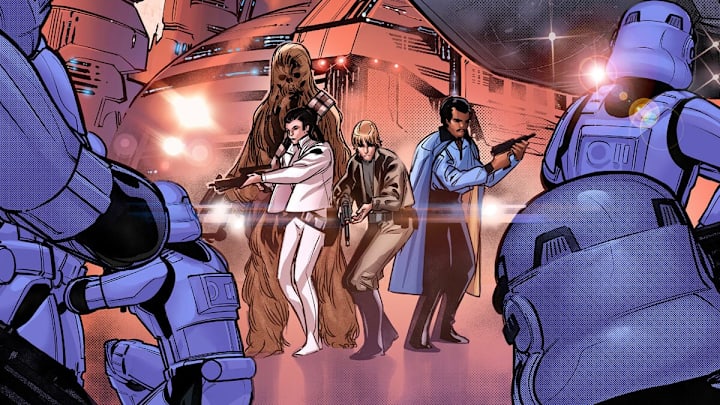The Star Wars franchise has always had an interplay between good and evil, and some of the most interesting stories have explored where heroes interact with a side that is not their natural state. I remember being both disappointed in and intrigued by Princess Leia attempting to assassinate Darth Vader in Alan Dean Foster's Splinter of the Mind's Eye. Dark Empire settled Luke into the role of Palpatine's apprentice, following in his father's footsteps years after Anakin Skywalker died as a Jedi.
Now, a recent comic played on those pulls between dark and light as the heroes of the Rebellion had to make a die choice about the ethics of fighting their enemy.
"Evil is everywhere."
Inverse has recently discussed the final comic issue of Charles Soule's Star Wars run. In the issue concluded the run that began in 2020, the story paints the rebels as more scummy than we previously thought, or at least more morally complicated. Writer Ryan Britt explains the framing of Luke Skywalker providing young Ben Solo by "trying to make a larger point with this story, illustrating a time when he and the Alliance grappled with a big ethical dilemma." Each of the four parts uses lines from the first movie "that references the Death Star."
As early as the 1970s Marvel comics, our heroes have tangled with technology beyond their knowledge, but in this story, we learn of a weapon called the Grim Rose. Says Britt, "The basic idea is that it uses genetic material from a person to create a kind of web that eventually will find that person and take them out."
This reminds me of a popular sci-fi trope that time-travelers try to kill Hitler in the past. The premise of "Hitler's Murder Paradox" has been explored in publications such as Forbes and the New York Times and an episode of The Twilight Zone, "Cradle of Darkness" sees Katherine Heigl travel back to kill infant Adolf.
The Grim Rose not only destroys the target but tracks down "all the people Palpatine has touched, and then, eventually... [destroys] him." It also kills "every person along the path it has followed to get there." That is quite a dark place to go in terms of standing against the evil of the Empire, and the responses of our heroes to the prospect are telling. Luke opposes it and eventually destroys it, but "Lando doesn't agree, saying he doesn't care how many people it takes out to get to Palpatine."
Given that this is the person who made a deal with Darth Vader and later repented, Lando is a likely character to paint with this potential for ruthlessness. Britt points out that "they're given the chance to put their finger on a doomsday button and heartlessly allow it to murder with impunity... [and] suggests our heroes were changed by their struggle against the Empire more than perhaps the films could ever reveal." It is, however, difficult to feel comfortable with the ensemble of characters who are so often defined by the goodness of their choices contemplating unnecessary slaughter. Like all of the other ways in which our world has considered such paradoxes as the "Hitler's Murder" one, it gives us pause for thought.
Star Wars #50 is now available at your local comic book store or digitally.
